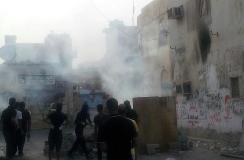The Bahrain Center for Human Rights (BCHR) has documented numerous cases of shotgun pellet injuries, as well as injuries sustained from direct hits from teargas canisters; many areas throughout Bahrain that have been indiscriminately blanketed with teargas as a form of collective punishment.
On the day of the race, the BCHR documented 16 arrests related to protests in the small town just of Jidhafs alone and and 10 house raids throughout the towns of Jidhafs, Sanabis and Aldaih. This repression was typical across the country, and the Bahrain Youth Society for Human Rights reports that they documented a total of 96 arrests including 12 children, with 21 individuals later released for the period from April 18th - 21st. A link to the full BYSHR can be found here: http://byshr.org/wp-content/BYSHR-Report-F1.pdf
Two years ago, the F1 race was cancelled in Bahrain because of the violence surrounding the government's crackdown on the pro-democracy movement. Last year it went forward amid much criticism and a heavy security presence that led to one protester being shot and killed by the police. This year, the streets of Bahrain were filled with tens of thousands of peaceful protesters demanding the cancellation of the race.

A shotgun injury from the weekend in Bahrain
The BCHR has received a large number of injury reports from across the country as a result of direct hits from tear gas canisters, shotgun pellets and tear gas inhalation. These individuals are forced to seek treatment in private homes out of fear of police brutality at the hospitals. As can be seen in the images above and blow, individuals injured by the police often choose to seek treatment in private homes. Jajjar Jassim, from Sitra, was arrested yesterday when he went to the Etihad hospital for treatment.
The BCHR recently released a report on the militarization of the Bahraini medical system - see: http://www.bahrainrights.org/en/node/5699 for more information.

The government crackdown also included the illegal and indiscriminate use of tear gas against ordinary citizens. In the video below, the security forces are seen firing tear gas canisters directly at three unarmed women walking down the street. The practice of firing canisters directly at individuals is illegal and has lead to several deaths in Bahrain since the pro-democracy movement started in 2011. The targeting of these women demonstrates the indiscriminate manner in which collective punishment is applied against ordinary citizens.
http://www.youtube.com/watch?v=XgfZPG3L94w&feature=youtu.be
In an attempt to hide the above types of abuses, the government deported several foreign journalists who were covering protests in one of the villages. The British ITV team was on assignment with the proper visas in place, according to the network, when the were detained at a police station and then deported. See http://www.guardian.co.uk/media/2013/apr/19/itv-news-forced-leave-bahrain for more information.
F1 racing CEO Bernie Ecclestone said over the weekend that Bahrain was 'stupid' to host the race. This letter from Americans for Democracy and Human Rights in Bahrain and other NGOs, and this letter from another group of NGOs including the Bahrain Center for Human Rights, explains in detail the reasons for opposition to the race, and calls for an end to the race in Bahrain as it represents a show of international support for a regime that continues to commit widespread human rights abuses.
The Bahrain Center for Human Rights demands:
-An immediate end to the government's repression and the excessive use of force that is being used against demonstrators.
-An investigation into the injuries suffered by protesters, and the demilitarisation of the medical system so that citizens can seek medical care without fear.
/129

